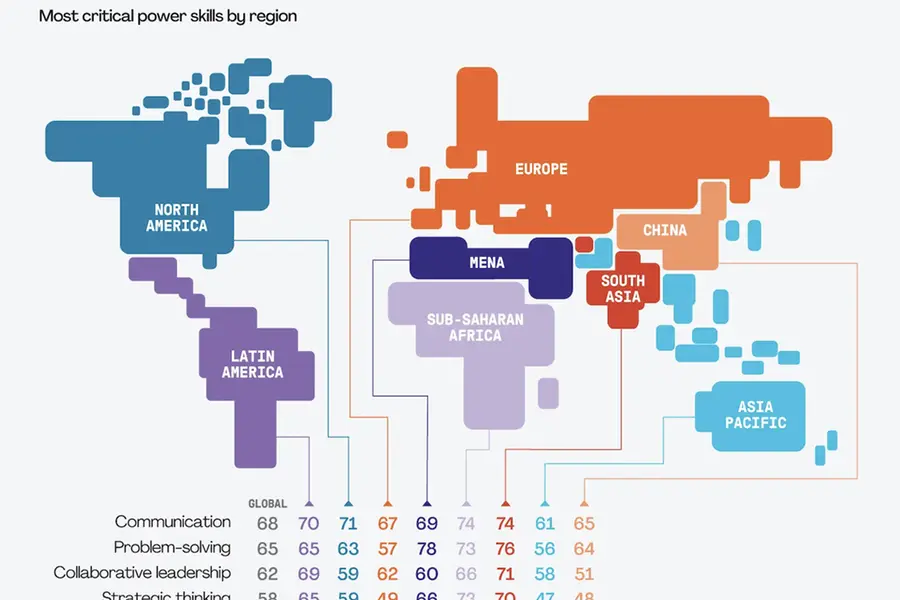PHOTO
Dubai:— As the dynamics of project management evolve in the Middle East and North Africa (MENA) region, compelling research by Project Management Institute (PMI) sheds light on the transformative impact of power skills on project success.
Power skills — also known as interpersonal skills or soft skills such as communication, problem-solving and collaborative leadership — are proving essential for project professionals. They are at the heart of leading successful teams, engaging stakeholders and conquering challenges to the project plan.
PMI’s Pulse of the Profession® 2023 report demonstrates how putting a priority on power skills helps project professionals and organizations redefine project success in our fast-pivoting world.
The report analyzes data from nearly 3,500 project professionals globally, with 7% of respondents hailing from the MENA region. It reveals that organizations prioritizing power skills significantly outperform their counterparts in benefits realization management (BRM) maturity, organizational agility, and project management maturity. Organizations that do not place a high priority on power skills are at a higher risk for projects that do not meet business goals, that experience scope creep and that lose more budget if the project fails.
The MENA region, with its unique blend of cultures and business environments, showcases distinctive trends in the importance assigned to power skills. Among the most critical power skills in the MENA region, problem-solving takes the lead with a remarkable score of 78, followed by communication (69), strategic thinking (66), and collaborative leadership (60).
Despite the proven correlation between power skills and project success, the report uncovers a significant disparity in the allocation of resources for professional development. Organizations allocate only a fraction of their budget (25%) for training and development to power skills, compared to over half (51%) for technical skills. This misalignment underscores the untapped potential for growth and success through investing in power skills development.
While the benefits of power skills are evident, barriers such as cost, and lack of perceived value persist. The talent decision makers report a perceived lack of value in power skills development at 35% in the MENA region. Organizations that consistently reinforce the importance of power skills in frequent touch points with employees are much more likely to see the value of power skills training and development.
The report highlights a missed opportunity in assessing power skills within teams. While individual assessments are more prevalent, connecting team performance to power skills through team-based assessments could yield increased organizational efficiency. Insights from project managers in the region emphasize the need for comprehensive assessments that delve into the effectiveness of communication, negotiation styles, and critical persuasion skills.
"We do have an annual assessment review for all employees. We assess communication and the ability to communicate. But I do not know if we do enough assessment of how effective the communication was, the style of communication, or how successful they were in critical negotiations and persuading others. Maybe we can enhance these assessments to include a lot of the power skills," said Mohammed Al Sadiq, Project Manager at Saudi Aramco.
The report concludes with a resounding call for organizations in the MENA region to prioritize power skills. By understanding the connection between project success and power skills, fostering a culture that embodies these skills, and integrating them into recruitment and performance processes, organizations can redefine success for both, themselves and the project professionals.
To access the full report for detailed insights in English and Arabic, please see here:
https://www.pmi.org/learning/thought-leadership/pulse/power-skills-redefining-project-success
-Ends-
About this Research
In March and April of 2022, PMI conducted and deployed the Annual PMI Global Survey on Project Management to 3,492 project professionals (individuals who use project skills to deliver change), including 538 project leaders (individuals responsible for the organization-wide integration of consistent project management methodologies and terminology, including directors who lead the organization's project management office (PMO). The survey explored multiple facets of project management, including key drivers of project success, power skills, evolution of the PMO, adoption of standardized project management practices, and professional training and development.
To better understand the factors driving the evolution of project management and the importance of power skills, we carried out interviews with 12 project management experts who serve in leadership roles in large organizations around the globe and have primary responsibility for projects and/or talent development for project managers. Their insights helped bring real-life examples to many of the key insights from the global survey.
About Project Management Institute (PMI)
PMI is the leading authority in project management, committed to advancing the project management profession to positively impact project success. We empower professionals to excel in project management practices through our growing global community, knowledge sharing, and best-in-class certifications—driving positive change in organizations and communities. Since 1969, our unwavering mission has been to advocate for the profession by offering life-long learning and connections to sharpen high-demand skills. Today, PMI provides professionals at every stage of their career journey with the globally recognized standards, online courses, thought leadership, events, and tools they need to succeed. With more than 300 chapters around the world, PMI members can network, find mentors, access career opportunities, and learn from peers, working together to drive greater impact. Visit us at: www.PMI.org, linkedin.com/company/projectmanagementinstitute, facebook.com/PMInstitute, and on X @PMInstitute.
For Press Inquiries and More Info, please contact:
Haripriya Khandelwal - Senior Account Executive
Email: haripriya.khandelwal@tbwaraad.com




















